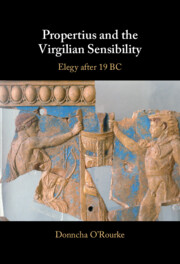Book contents
- Propertius and the Virgilian Sensibility
- Propertius and the Virgilian Sensibility
- Copyright page
- Dedication
- Contents
- Acknowledgements
- Abbreviations
- About the Texts and Translations Used in This Book
- Chapter 1 Introduction: Virgil and the Propertian Sensibility
- Chapter 2 Rus in Urbe
- Chapter 3 Shades of Dido
- Chapter 4 The Shield of Propertius
- Chapter 5 Romani patria Callimachi
- Chapter 6 Propertius’ Epic Designs
- Chapter 7 Conclusions
- Bibliography
- Index Locorum
- General Index
Chapter 4 - The Shield of Propertius
Virgilian Histories in Propertius 4
Published online by Cambridge University Press: 28 November 2024
- Propertius and the Virgilian Sensibility
- Propertius and the Virgilian Sensibility
- Copyright page
- Dedication
- Contents
- Acknowledgements
- Abbreviations
- About the Texts and Translations Used in This Book
- Chapter 1 Introduction: Virgil and the Propertian Sensibility
- Chapter 2 Rus in Urbe
- Chapter 3 Shades of Dido
- Chapter 4 The Shield of Propertius
- Chapter 5 Romani patria Callimachi
- Chapter 6 Propertius’ Epic Designs
- Chapter 7 Conclusions
- Bibliography
- Index Locorum
- General Index
Summary
Propertius’ elegies on the rise of Rome (4.1), the treachery of Tarpeia (4.4), the Battle of Actium (4.6) and the spoils thrice dedicated to Jupiter Feretrius (4.10) boast ostensibly triumphant and teleological narratives that have little by way of elegiac sensibility. Yet this chapter argues that Propertius accesses via Virgil’s Aeneid alternative and less self-assured histories based on repetition and defeat. A locus for this tension betweeen linear and circular chronology is the shield of Aeneas, with its presentation of historical scenes up to Actium, an ecphrasis that Propertius recasts (with an eye on its notionally static and spatial properties) in his own description of Actium in elegy 4.6. The shield features also in elegy 4.4 to associate Tarpeia’s treachery with the Gallic sack of Rome, a historical ‘interpenetration’ much in keeping with Virgilian technique. In 4.10 further intertextuality with the Aeneid multiplies the canonical three dedications of spolia opima in a way that destabilizes the institutionalized Augustan history of Jupiter Feretrius. Ultimately, Propertius’ reading of Virgil implies that not even Rome is immune to the vicissitudes of an elegiac history.
Keywords
- Type
- Chapter
- Information
- Propertius and the Virgilian SensibilityElegy after 19 BC, pp. 200 - 259Publisher: Cambridge University PressPrint publication year: 2024

